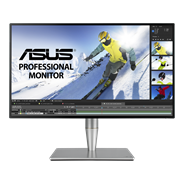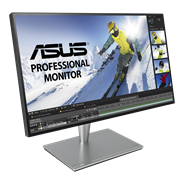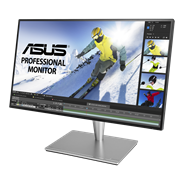
Final Pixel is a Global Creative Studio specializing in virtual production for film, TV and advertising. Launched in 2020, this all-in-one creative production studio blends realistic 3D worlds with real world sets to create photoreal and cinematic environments in real-time. Its expertise in virtual production stems from an extensive heritage working as a creative agency producing content for major US networks and brands. Having team members in London, New York and Los Angeles, Final Pixel is offering truly flexible solutions to producers across the globe.
Recommended Product
ASUS ProArt Display PA27AC HDR Professional Monitor - (68.58 cm) 27-inch, WQHD, HDR-10, 100% of sRGB, color accuracy ΔE < 2, Thunderbolt™ 3, Hardware Calibration
Intel Z890 LGA1851 ATX content creation motherboard with PCIe® 5.0, DDR5 slots, two USB4® ports, 10G and 2.5G Ethernet, WiFi 7, five M.2 slots, plus a USB 20Gpbs front-panel header
AMD X870E Ryzen AM5 ATX content creation motherboard with PCIe® 5.0, DDR5 support, dual USB4®, 10G & 2.5 Gb Ethernet, WiFi 7, four M.2 slots, plus a USB 20Gbps front-panel connector with 30W USB Power Delivery 3.0 and Quick Charge 4+
Intel® Z790 LGA 1700 ATX creator motherboard with PCIe® 5.0 , DDR5 support, Thunderbolt™ 4 (USB4® compliant), 10 Gb & 2.5 Gb Ethernet, WiFi 6E, four M.2 slots, plus a USB 3.2 Gen 2x2 front panel connector with Quick Charge 4+ up to 60W
AMD X670 Ryzen AM5 ATX content creation motherboard with PCIe® 5.0 , DDR5 support, dual USB4®, 10 Gb & 2.5 Gb Ethernet, WiFi 6E, four M.2 slots, plus a USB 3.2 Gen 2x2 front panel connector with Quick Charge 4+ support
Create with ProArt
The challenges
When working on virtual production set, color accuracy is everything. Final Pixel needs to be assured that it is able to keep the color consistency throughout the virtual production pipeline. Dominic Maher works as the Stage Operator for Final Pixel and he knows just how important color accuracy is on set: “We put a lot of effort into maintaining that color every stage of the process and if it falls down to the point of the reference monitor, which we're all looking at, it's a huge problem for us”.
As Michael mentioned, the vast adaptation of LED volume stages has enabled filmmakers to produce almost anything and anywhere. What this means is that filmmakers need hardware that is not only portable and easy to set up, but also scalable and compatible with other equipment used in even more complex production environments.
As Michael mentioned, the vast adaptation of LED volume stages has enabled filmmakers to produce almost anything and anywhere. What this means is that filmmakers need hardware that is not only portable and easy to set up, but also scalable and compatible with other equipment used in even more complex production environments.
Portable and scalable solutions in any studio locations
As a global company, Final Pixel needs to be able to take its technology with them anywhere it goes. The ProArt Display OLED PA32DC comes with a built-in auto-calibration tool, which is hugely valuable when working on different locations. It saves time and gives Final Pixel the confidence and reassurance that what they are seeing on the monitor, is what they should be seeing and so is everyone else.
The monitor has a handle in the back and multiple connection ports on both sides of the display. This makes this monitor agile to carry and quick to set up in different studio locations making this monitor a versatile monitoring solution for Final Pixel.
“This technology is hugely scalable and portable in the sense that we can bring all that into the studio, set up swiftly, and begin teaching people how to use virtual production,” says Michael McKenna, CEO & Director of Virtual Production.
To be able to blend together the live action and game engine footage, Final Pixel uses the ProArt Display PA32UCG during the post-production process. The monitor’s peak brightness up to 1600 nits enables Final Pixel to match or even exceed the brightness offered from the LED walls. Working with game engines such as Unreal Engine, Dominic mentions how it is important to have a monitor that is also powerful enough to render as high frame rates as possible. Final Pixel is often filming at 25 fps during the pre and post-production process, and having a ProArt monitor that has a refresh rate of up to 120Hz makes the post-production process incredibly efficient for Unreal Engine technicians.
The monitor has a handle in the back and multiple connection ports on both sides of the display. This makes this monitor agile to carry and quick to set up in different studio locations making this monitor a versatile monitoring solution for Final Pixel.
“This technology is hugely scalable and portable in the sense that we can bring all that into the studio, set up swiftly, and begin teaching people how to use virtual production,” says Michael McKenna, CEO & Director of Virtual Production.
To be able to blend together the live action and game engine footage, Final Pixel uses the ProArt Display PA32UCG during the post-production process. The monitor’s peak brightness up to 1600 nits enables Final Pixel to match or even exceed the brightness offered from the LED walls. Working with game engines such as Unreal Engine, Dominic mentions how it is important to have a monitor that is also powerful enough to render as high frame rates as possible. Final Pixel is often filming at 25 fps during the pre and post-production process, and having a ProArt monitor that has a refresh rate of up to 120Hz makes the post-production process incredibly efficient for Unreal Engine technicians.
Color accuracy on set
To ensure Final Pixel has the color accurate solutions on set, the company uses the ASUS ProArt Display OLED PA32DC monitor as its reference monitor. The monitor has a premium OLED panel with RGB stripes that supports both great brightness and true blacks. Working in 4K HDR, it is inevitable to have a monitor that ensures the color moves correctly through every stage of the production process. With true 10-bit color and 99% DCI-P3 color gamut, Final Pixel can be assured that what its staff are seeing on set is what is shown on the final finished delivery on the monitor.
The outcome
Blending game technology with traditional filmmaking methods, virtual production allows directors and producers to work with live actors inside the digital environments. Since ASUS has a strong background in gaming motherboards, it has the advantage when it comes to empowering virtual production. The experience and knowledge to produce hardware solutions to studios like Final Pixel, positions ASUS ProArt as the industry choice when it comes to driving the future of filmmaking.
“Me and the team are very much looking forward to continuing to work with the ASUS ProArt products,” concludes Dominic. “We've been really impressed by what we've seen so far. We're excited to see what new developments they come up with.”
“Me and the team are very much looking forward to continuing to work with the ASUS ProArt products,” concludes Dominic. “We've been really impressed by what we've seen so far. We're excited to see what new developments they come up with.”


